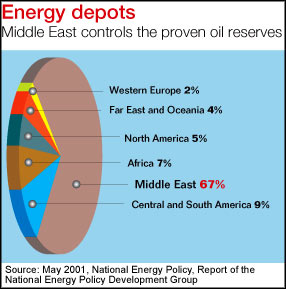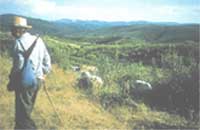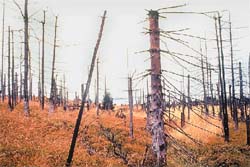
Private investors wary of small hydro
Efforts at realising the vastly untapped potential of hydel power in the country are hampered by lack of finances

Efforts at realising the vastly untapped potential of hydel power in the country are hampered by lack of finances
Effluents threaten Nilgiri
A study on polychlorinated biphenyls in Russia may throw up some startling findings
US Senate s energy bill

Scientists are trying to integrate a new type of circuits called reversible circuits into computers to make them more energy efficient

Ruthenium Iinked DNA strands can make genetic testing cheap enough to be commonly employed

The snag ridden past of Rajasthan Atomic Power Station's unit I may have caught up with it
The Sindh Chamber of Agriculture (SCA) on Sunday asked the government to increase wheat procurement target from 25 per cent to 40 per cent. The chamber's senior vice-president Dr Shahnawaz Shah said at a meeting at the Agriculture Complex that the government should pay growers an additional Rs40 for each 40 kilogrammes of wheat from its own funds to help them offset the high cost of fertilisers and pesticides. The meeting observed that the poor growers would suffer huge losses as the cost of production was much higher than the government's procurement rate of Rs510 per maund and demanded that the procurement offices should be established at union council level and the mode of payment to growers should be simplified. The growers called upon the newly-elected members of the national and provincial assemblies to take up the issue of sugarcane at the first session of assemblies and adopt resolutions against the excesses of sugar mill owners. They demanded that assemblies should ensure that the growers were paid the official rate of Rs63 per 40 kg and pointed out that the cane's production in the province had dropped by 20 per cent due to sugar mill owners' highhandedness and reduced price. Anwar Bachani, Mir Imdad Talpur, Mohammad Khan Sarejo and Nawaz Ali Samejo were among the participants of the meeting. HCCI: The president of the Hyderabad Chamber of Commerce and Industry Haji Mohammad Yaqoob on Sunday criticised raids on glass bangle factories by the officials of labour department and said it had seriously hurt the business. He said after meeting a delegation of the office-bearers of Glass Bangle Association that if bangle manufacturing units were closed due to harassment, thousands of workers including a large number of would lose their jobs. He said that the additional director and joint director of labour usually raided factories sometime before morning prayers, which was adversely affecting the production process. Under the relevant labour laws, the officials were supposed to visit the factories only once a year and they were creating harassment by conducting raids on a daily basis, he said. In a separate statement to press, the HCCI president demanded that the government should take back raise in the prices of petrol, diesel and electricity. Increase in power tariff would deal a serious blow to agricultural and industrial production and raise in oil prices would further ratchet up transport fare and prices of other essential items, he said. The cost of industrial production would shoot up considerably due to increase in the prices of petrol, diesel and electricity, which in turn would lead to hyperinflation, he observed. He said that the country was in the grip of energy crisis and urged the government to formulate short term and long term policies to tackle the problem.
<p>This November brought back reflections of my two study visits of Swedish power plants. The visits were done during the same months of previous two years while pursuing higher studies at a Swedish university.

Narasimharaju's dream of providing inexpensive cement for rural use will come true when his plant starts production later this year.

Petroleum fuels the engines of the global economy. So there is never enough of it. Oil politics dictates international relations

How does a civilisation relate to the environment? To find out, study its attitude towards large carnivores. Europeans have tried to dominate nature. In the process, they have exterminated several large carnivores like the wolf. But communities in India

Many European nations have banned the free passage of toxic waste between borders, despite the common market concept.

The TV serial of the late 1980s is now available as a video series. Although its message of self reliance is a bit dated, it still is a useful mix of science, history and social development.

Ordered by the Supreme Court to shift stone crushers from the Delhi Faridabad border, officials have arbitrarily moved them to a nearby village, paying little heed to their welfare

An NGO is helping residents of a Kanpur slum to get amenities like drinking water, latrines and medical care

Scientists became aware of acid rain more than a century ago

The Netherlands leads the way in sustainable investments funds that go towards the setting up of projects that are ecologically viable

Clearing the Ganga, is their mission even if it means fishing out scores of bodies from the river

The Sukruli cauldron threatens to boil over if the Orissa government does not act against the smoke spewing sponge iron plant in the area.